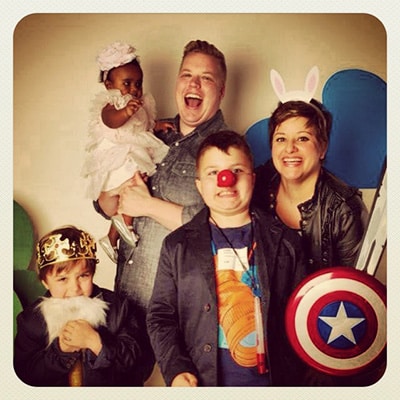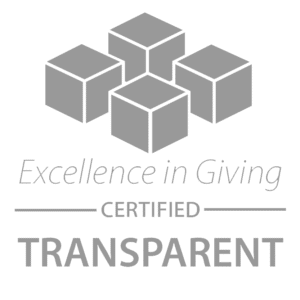You’re listening to together by AGCI. I’m Melissa Rush.
Today, we’re talking about something that is so common, but rarely discussed. Post-adoption depression affects between 10 and 32% of adoptive parents. This number is even higher for women. Up to 65% of adoptive moms struggle with post-adoption depression. While this is a common condition, stigma, and lack of information can make post-adoption depression feel very isolating. If this is something you’re navigating right now, please know you’re not alone. Our very own Marisa Butterworth struggled with post-adoption depression. And I feel so honored to be in conversation with her today about this important topic. If this conversation brings up any difficult emotions for you, please reach out to AGCS post-adoption team. There are so many resources available and we are here to help. It’s important to remember there is always hope and you are never alone. Let’s get into our conversation.
Marisa, I’m so honored that you’re sharing your journey with us. Can you start by walking us through your adoption story? We always knew my husband and I both knew we wanted to adopt, even when we were little kids, like I think God put it on our hearts back then. And so it just kind of worked out that way that we ended up having the boys. And then I actually went on a mission trip in Thailand and I was playing with these kids at an orphanage. And I came home from that trip.
And I said to Jesse, our child is out there somewhere. It’s time to start adopting. And he was not like totally on board yet. He was like, oh, okay. Like our kids are little. Okay. And so, Hey, because I’m a wise and patient woman, I’m saying you have one month, let me give him a timeline. Yeah, totally. It’s like, this is, this is your month. It’s starting now. And so we ended up starting the process. We chose AGCI and we kind of, we thought it would be like a year and a half. And it was almost three years by the time that we brought her home, that was really hard and unexpected things. And Ethiopia kept unraveling there. And so it affected our process on this end, but we obviously did get her home. She was a baby. We thought she’d be like two or three. We just kind of assumed. And she, we had our referral when she was six weeks old, so she was tiny. And then we met her at four months old and then we’re able to bring her home at five months old. So we really came home with like a baby bath. And that was a little bit of a shock to the system for me, like as the mom, because I honestly like, at that point, my oldest was eight and my youngest was five because it took so much longer than we anticipated.
And I was going back to baby stage and like not sleeping. And we had the added, like she had had trauma in her sleep. So when she came home, she didn’t sleep for four years. Like that was her, there were a lot of other things that can happen that we were for whatever reason. We just weren’t like prepped for what that would look like mentally. And so we entered into that, not knowing how long it would be. And yeah, she was a delight. We all, she was like such a gift to us. And then it was also really hard. Like we, and we knew it would be hard, but you can’t, you don’t know how it feels until you’re in it. And we were in it. Yeah. Yeah. Well going back to having a five and an eight year old and then going back to having essentially a newborn. Yeah. That’s a pretty stark transition. Yeah, yeah, yeah. It was definitely, it, it was a lot like, and again, we were, so there were so many things we were like prepared for that. It could have been harder, but there’s nothing like sleep deprivation. Yeah. Yeah. So, you know, it’s a special kind of, because, especially so, you know, obviously, so this was hard at like when did you realize that you were struggling with post-adoption depression? Like what did that look like for you? That is a great question.
So I, because I had had two boys, my first was, was my first experience with postpartum depression. And it’s actually like, it wasn’t funny, but it’s funny now. So I had no idea what I was doing then I didn’t know, people talked about baby blues. I had heard about postpartum, but again, like, you don’t really know what it feels like, and it’s kind of gradual, you don’t realize it’s happening until you’re in the thick of things. And so my husband and I had kind of like a joke between us. And obviously it was really hard, like going through postpartum depression. But afterward I had said to him, like, when I demonstrate these symptoms, you say something like, I’m not going to see it. I know now I’m not going to see it myself. But with my oldest, like the signs were that I stopped showering and I was just home. I didn’t leave the house. I just hung out there. I isolated myself. And then the joke part of it is that at some point during that, I thought it was a great idea to buy a fake ponytail. So I would like slick my old hair bag that I hadn’t watched in days and clip on a fake ponytail. And that was like the signal. If I buy myself a fake ponytail, no, something’s wrong. Cause SOS, yeah. Something seriously wrong.
And so like, I joke about it, but there were those like things that started happening, like I cried a lot, but I also felt happy. Like I was so happy she was home. I adored her right away. It wasn’t even a question sometimes of attachment or different things like that. Like I adored her. She was great, but I was overwhelmed like with everything, having a third child I’ve heard now, the third is sometimes the hardest. I don’t know if that’s true or not, but I felt, I, like I said, isolated myself again. And some of that was under the guise of like, well, we’re nesting here at home. And so I can’t go anywhere, but I didn’t think of even doing any self care because that felt selfish to me in that moment of like, gosh, my, my boys are adjusting to having a new sibling. My daughter is adjusting to like life with us, which is crazy and chaotic and yeah. And of course they’re not going to take care of myself. So it really like ended up being those things that eventually Jessie, my husband said like, okay, I don’t think you’re okay. Like you’re crying all the time now. And you know, it ended up being our signal to each other at that point. Yeah. How did Jesse like broach that with you and how did you feel when he said I don’t care.
That’s a good question because I, it w I was not in a place to readily accept that, but he was very gentle with me and he, and I mean, every time he’d come home from work, I would cry. It was like, just like, oh, and like ball. And so he was just holding me and he said, honey, do you think that maybe he, he gave it to me, which was like such a big thing. But do you think that maybe this is happening again? Like I know that at that point, we didn’t even know what post adoption depression was. And so he’s like, but obviously something’s going on. Do you think that maybe you should get checked out or see a counselor or like, let’s not let this go on forever again, which I did with the first round with post partum. And it wasn’t until later that I even recognized that that’s what was happening with me. So, you know, it was like such a beautiful thing because it could’ve gone the other direction or he could’ve come down on me or been cruel about it or not understanding that he accepted me where I was put it back to me, like gently. I was like, do you think that maybe this could be it because this is what’s happening. And, and I, he was worried about me.
And so luckily he had the insight and wisdom and knew me well enough and was gentle with me, you know? And the first time when I had post partum depression with my son, I was not as I was like, trying to figure out how to do it myself. Like, I’ll be fine. I’ll, you know, power through this. I’ll get better eventually. And I did, but things were damaged in the meantime. And I wasn’t okay for awhile after that. So, yeah. I’m so glad that you have such a great support system and your husband and that he was able to like gently suggest to you, you know, Hey, you don’t seem okay. Like what can we, how can we help you start to feel better? And cause, and I think that’s also why it’s so important to talk about these things. Because for someone maybe listening or hearing this, you know, a friend that you have, it’s like, oh, like I’m feeling that way. That’s what this may be. This is what this is. And there’s, there is hope and there are resources and, and things for exactly. And also I want to mention like men can get post adoption depression as well. So, and I think there’s even more of a stigma stigma around men being depressed. Then there is, there’s a little more of an acceptance like, oh, women can get this, but men can get it too.
And you know, it’s not necessarily hormone driven in the same way as postpartum, but it, it happens. It’s real. And a lot of people get it, men and women. So it’s just something to go into your adoption. Or even if you’re in that point now and say, Hey, maybe something else is at play here and I need help. And that’s okay. Yeah. I’m glad that you brought that up. Cause I, I do think there is so much more pressure on men to be like stoic and kind of like there for their families in that way. And to like acknowledge that you’re having a hard time can be particularly difficult. And, but you are not alone if that’s something you’re going through as well. Speaking of that, did you like, did you feel, I mean, obviously you had Jesse, but did you feel like alone in that time, did you feel like you had friends or family that you could talk to about what you’re going through? No, and it was of my own doing, I would say because I did, but I felt ashamed in that, that I, I felt weak. I had here, I was, I had waited three years. I had posted about it. I was so excited.
And then it felt like some kind of admission of some, I don’t even know what if some sort of weakness or mental weakness that I would have her there with me and be, and love her so much and also be so sad. It felt like, so I didn’t tell people what I was going through. I didn’t, I wasn’t proactive and getting out, like even going on a walk, I didn’t want to do anything. I didn’t want to leave the house. It was really, I, I wish that I did it sooner. It wouldn’t have been so hard and I eventually did get there, but not right away. It felt like, you know, I was admitting some sort of weakness personally. Yeah. Well, and I, I just think it’s important to say like, obviously that is not true. It’s not a personal failing. It’s not, it’s just a brain chemistry thing that can happen to anyone. Yeah. I’m sorry that you felt alone in that time. So after, you know, having that conversation with Jesse and obviously you, you, you know, you had kind of to a certain extent been through this before with struggling with postpartum depression, what steps did you start to take? Hmm, that’s a good question. So after Jesse, like helped, helped me kind of identify it where I was like, yes, I think something’s actually wrong.
At that point, I reached out to a few friends that I knew were in counseling and I found a counselor I called and said, nothing’s wrong. You know, left a message. I think I was crying on the voicemail and finally got in touch with someone. And I mean, met with her. I cried my eyes out through the whole first session where I was like, oh gosh, I can’t even, and I think I barely like got things out, but she was the first person that told me about post-adoption depression. And she said, w which this sounds defeating, but it wasn’t. She said, Marisa you’re severely depressed. And that was like, oh, okay. I am like, I’m severely depressed. Like, no wonder. I feel like the essay took it almost from being like a weakness to like, oh, I’m fighting something bigger than that. And then she also advise me to get on antidepressants right away and go see my doctor and tell them how I was feeling. And honestly, my first reaction to that, I had never been medicated for anything mental health wise at that point. And my first reaction was like, oh, I don’t know if I want to be medicated that I don’t know. I just, you know, isn’t it enough for me to just get in here and talk to you? And she said, well, first thing she said was, well, Marisa, you just cried through the whole session.
Like, it, it wasn’t, it’s good. You’re telling me all this, but it’s, if we do this every time, it’s not going to be productive. Like we need to get you to kind of a baseline where he has your feeling, all these things, but also you can like get through it without like bawling constantly. And, and then the other thing she said to me that really hit me hard personally, was she’s like, Marisa, do you take antibiotics? If you have like a, like case of strep throat or something? And I was like, well, yeah, of course they she’s like, well, your brain is sick right now. Like, it’s the same thing. You’re, you’re medicating something sick in your body so that you can get well. And some people end up on antidepressants or antianxiety medication, their entire life, and that’s fine. And some people end up, you know, taking them during that season and they’re able to go off of them later on. And that’s great too, but give yourself a chance. And so that for me was convicting, I still felt like ashamed that I had to be on something. And that, you know, there was a message like within the church. And I think it still exists out there that I should be able to pray my way out of it. And I couldn’t, I tried, I felt God’s presence and I knew he was there, but it wasn’t getting better.
And I think that, that was actually what God sent me was the message that it was okay to take something. And he was going to walk with me through all of that, regardless of that, it wasn’t a personal weakness, but I had to go on something, which now I look back at that and I’m like, oh gosh, that’s I can’t even believe that. I thought that. Yeah. But then it was big. It felt defeating. And I did have a family member who, you know, gave me a talking to that. I wasn’t trusting God enough with this. And, and I was very it’s hurtful. It was hurtful. And it was, I was at a really low point. So to even be in the position to have to like defend myself, felt like too much. So I ended up, you know, getting off the phone and having another good cry and deciding, okay, there are people that can know this and that there are people that don’t need to know this. And that’s okay. There are people that I trust with this and, and that’s okay. You know, and then as I got stronger, I was obviously able to share it and not feel that like, shame that I had felt before. Yeah. Thank you for sharing that. I think that’s like, well, I hope it helps somebody. I mean that it’s okay. Yeah.
And it’s so funny how we have, like, I think mental health stuff in a separate box where yeah. I mean, I’m so glad you had a counselor who said like, why wouldn’t you would take antibiotics if you were sick, why would you not, you know, your, this isn’t getting better on its own. And it could, you know, I mean, it can get to a point that’s like a really unsafe and I was there. I was getting there to save point. Well, and the other thing that I think is important is that it was hard to be in counseling or therapy. Like that’s hard. And I made myself go every week and I felt guilty that I was leaving my new daughter and guilty that I was leaving my boys and my husband and all of those things. But it eventually turned into self care for me of like, oh, I have to do this so that I can be the mom that I need to be. And things got hard. I had to face some really big things. And I would just encourage anyone.
I mean, you get to that point where it feels uncomfortable and hard and you get off a call and your her, or, you know, however people are doing it now, like zoom therapy, whatever it looks like, or get out of an appointment that you, that you keep going back, even though it doesn’t feel good right away, because you’re addressing big things. It’s not just, you know, yeah. That’s like healing. It’s like, it’s not always like, you know, you break a bone or something. It’s not like comfortable to be in that cast or be going through that process. But likely that’s a good analogy. Yeah. It’s the only way you’re going to get better and it’s uncomfortable. Yeah. But keep going, keep, you know, keep taking care of yourself. Yeah. Yeah. And it’s not selfish to, to know that, oh my gosh makes you, when you are then with your kids, you’re able to be the mom that they need. And if you don’t take that time, you know, it affects, it affects everyone in your life, you know? Yeah, exactly. Totally. So obviously, I mean, well maybe it’s not obvious, but postpartum and post-adoption depression are really common. Like a lot of people struggle with these things and because of unfortunately stigma and like you just talked about shame and all of that, like, people don’t talk about it.
Like you might see someone on Instagram or something, you know, looks happy and smiling and they might have just been sobbing right after that. Yeah. You have no idea. People are going through. Why is it important to you now to kind of, you know, having that in the rear view a bit to like to talk about this now and to shed light on it. I just don’t want people to feel like I did. If people can be steps ahead of where I was. I think that’s great. It’s something that more and more people are talking about that actually AGCI is going to be talking about more and more here in the future, because it’s so important. And just letting people know that it’s real, it exists. There’s a chance you might have it, men and women, it’s, it doesn’t discriminate how this will look for you. And, and just getting some of the resources out there because it was hard for me then to like, even reach out to a few people that I know saw a therapist, like, I’m like, what do I do? It feels like, I don’t know. I felt frozen under the weight of trying to take care of myself and like, who do I call? Where do I start? So I have resources that I’d love to share of like things that you can do to take care of yourself, to not go the way that I would.
And like bury it and stay, you know, alone at home with my fake ponytail. That was the other time. But, you know, I didn’t buy a fake hair that time. So that was a winter stuff. Yeah. Right. So, sorry, I just like, my brain froze you. You mentioned that you felt kind of, I don’t know, like there was kind of like maybe a stigma within the church. Did you feel that in the adoption community as well? Like what? Well, I did, I think, but not for many thing they had done. Yeah. There, there was just the idea that I should have it all together. Like even when your social worker comes for the first time and it’s like, okay, I’ve got the house clean. I think I’ve got everything like hazardous chemicals put away. Like I’ve got all the safety knobs on the outlets. Like we’re going to do this. I think we can do this. And so there is, there was that idea that I had in my head that I should have everything together. And that, that was the expectation of me that I should have everything perfect and together, which of course they know realistically that my like, house isn’t always immaculate, absolutely perfectly organized. I mean, I organize things for my social worker. Like in case she went through my cabinets, which she did, she was crazy, but like, she actually ended up being a resource for me.
I finally shared it with her that I was going through that. And she ended up, she was getting her doctrine in, in something around this. I don’t even remember what it was, but she came every week to study me and to give me like tips on how for it not to affect Harper at a time where like one of her things I always remember was like, Hey, I know you don’t feel like smiling. I know you can’t even find that in yourself. But when you’re with Harper, look her in the eyes and smile. Like, even if it’s fake for a little while and you get back to that point where you can smile at her genuinely, like she needs that like eye contact and she needs to see you smiling. She needs that from you. And, and she gave me permission to also not be okay. Like I didn’t ha I could fake it for a little bit, you know? And so it was a gift I wouldn’t have even known. I didn’t know. She was like going back to school to do that. And so by opening up, she gave me permission. She came every week, I started to show her that I wasn’t perfect or what my idea of perfection was. And like lo and behold, she was there to support me instead of, you know. Yeah.
That just seems like to me, I mean, hearing, you know, and unfortunately you kind of had some judgment when you were kind of like realizing this is what was going on and that, you know, oh, I should be able to pray this away. And that seems like to me, like, God kind of stepping it, like when you opened up and when you were open to help and open, like all these people kind of come into your life and tell you, like you’re not alone. And it just so happens. Your social worker is to, you know what I mean? That feels like all the things. Yeah. And I didn’t want to tell AGCI and I honestly, it didn’t even cross my mind as an option, which I look back at it again. But I was thinking of AGCI really as like our post-adoption team as someone that, or people that were there to support Harper’s transition. And I didn’t think about them, them for myself. I, I know they told me that they were available for. Yeah. But in that moment, I only thought about her. I was like, it didn’t even cross my mind that I should have reached out to them. They would have resources readily available and would have been so supportive because they work with families all the time that are going through these things.
But it just, it didn’t even, I was in a stress mindset and it didn’t even cross my mind as an option. And I wish looking back, it would’ve been so much better if I would have. Yeah. Yeah. It’s it’s it was scary. Yeah. Well, it is scary. I mean, it is scary. Cause I think, especially if you’ve kind of had someone not accept what you’re saying or judge you for it, like, it makes you more guarded over who you share that with you. If you feel like there’s and for anyone listening AGCI is a safe place to talk to you about these things. None of us have it all together. No, no, absolutely not. But yeah. I think, you know, if, if you’re worried, especially when it feels like, oh, like this is, you know, they’re coming and checking on me and all of these things and you know, you’re worried like, well, is that gonna, are they gonna think I can’t parent my child or anything like that. And it’s not true. Not true, but yeah. So, I mean, I think it makes sense why you felt that hesitation. So you, you mentioned that you had some like resources, like if someone is struggling with post-adoption depression, like what’s, what’s like a something they can do right now. Like what’s the first step they should take. I would actually do the, not the opposite of what I did, but I would call AGCI first.
I wish that I did, I would call, I mean, we have a post-adoption team, but for me, I didn’t know them yet. They had kind of reached out here, there. I didn’t feel safe if you have anyone at AGCI that you’d know, call them and say, this is going on. I don’t know what to do. And they will help direct you. If they’re not the person, they will help you find the person on our team that can help you. And, and in doing that, they would have been able to give me the resources. Right. Then I wouldn’t have had to call around, find a counselor. They would have said in your area, here’s who we know about. Make sure you talk to your social worker. You know, there is no stigma. There, there should be no shame. No, let’s get you the help we need. So if you’re going to do one thing, I would start there and just let them know and let them be that resource and advocate for you now, because that’s what they’re literally there for. And they will not shame you at all. They will come alongside of you in that moment. So I think that’s the first thing I would do and I have other resources, but it feels like a lot sometimes. So start there. Let’s start there. Yeah.
Well, so if you’ve taken that step and they’re maybe ready for more resources, or can you share anything else that you know, would be helpful for someone struggling with post-adoption totally. I think don’t isolate yourself, make yourself, go out to coffee with a friend, make yourself, get out of the house. Even if it’s going on a walk in your neighborhood with your child, like make yourself, get out of the house and ask for help. If you need it, like call a friend and say, I need to get out. I’m so unmotivated. Can you come to my house and walk with me? Then you can’t get out of it, but, but advocate for yourself and like have that self care, you know, unless your friends, your neighbors, your church, community, whoever it is that you trust your spouse so that you can take care of that. And you know, then focus on actually bonding with your child because you can’t do both at the same time. Very well. It’s really hard. Then I would also, I just know if you have had a predisposition for depression and I did that, there’s a chance, a higher chance that you will be depressed in that moment, prep yourself for that. If you haven’t brought your child home. And if you have take it as a comfort, that, okay, my body’s responding the way it does. Yeah. And now I know what to do.
Or now I have the resources to, you know, help me right now. Definitely contact a counselor or a mental health provider of some sort. I would see someone that’s a professional. I would not go to a lay counselor for this. I know sometimes those are great options, but there are counselors available at different price ranges. There are schools around that. You can even see someone, but someone that’s had some training and can walk you through depression and like how to get out of that. I would also just protect yourself from the feeling that perfection is the way to go. So if that’s letting your house be dirty or like just love yourself through whatever it looks like. If, if your kids have an unhealthy meal, like just that’s great. I have fed them. Yeah. They’re fed. They’re fed. So what did they had chicken nuggets every night, this week. That was what I did. And that was great. Yeah. Reach out to people in your, in your community, your friends and tell people I need help, which is the hardest thing to ask for it. But even just letting people bring you meals, or like taking some of the stress off. One of my friends had adopted and like a year prior and she brought me like three grocery bags, full of like snacks, freezer meals, like stuff that I can make quickly for my kids. Like cereals, yogurts, just stuff like that.
That wasn’t even like a meal put together. Just easy stuff. Like tell people because they want to help you. And then, you know, like we’ve talked about, don’t be afraid if you’re advised to go on antidepressants, don’t be afraid of those. It took me, I think I tried four different medications and the fourth was the one that worked for me. The best go into it, knowing that it might not be the like quick fix that you hope it will be in. It takes time to build up in your system. But just knowing that there is help on the way can make you feel better too. But don’t be afraid to advocate for yourself, even though it feels scary and big and too big, or we’re, I mean, ask your husband, your wife, one of your best friends for help in that. Like, I can’t even call someone right now. Can you call, can you call AGCI for me? I can’t even like, don’t be afraid. We’ve all been there. Most people have been there. Absolutely. And I think like, it is so scary to ask for help. Like I think for a lot of people, like, it feels like, oh, I can’t do this on my own, but I think like, think about if your best friend, if your spouse, like, I need help, I need, you would never, you would just be like, absolutely. What can I do? You know?
And so I think it’s like helpful to think of, you know, how can you be a friend to yourself, right. Like, yes, well, it shouldn’t place this on yourself when it’s happening. But like, I’m hoping from doing this and being open myself that it, it helps other people. And I think whenever I’ve done that, or whenever I’ve had friends that have done that with me and been open and honest and asked for help, it gives me permission to feel that same thing. It gives me it, it makes us all human. When we, you know, are open and loving with each other through that. So like let other people have the opportunity to love you. Well, that was Marisa Butterworth co-host of the Together by AGCI podcast and West Coast Advancement Officer.
Thanks for listening to Together by AGCI. As always, if you liked what you’ve heard, please rate or review us wherever you listen to podcasts. If you’d like to read or watch even more stories, check out our website, www.allgodschildren.org, reach out to us and let us know what you think on Instagram at @allgodschildreninternational or email us at together@allgodschildren.org. We look forward to sharing another story of hope. The next time we’re together. We’ll talk to you soon.










